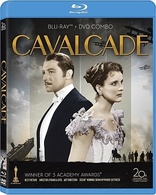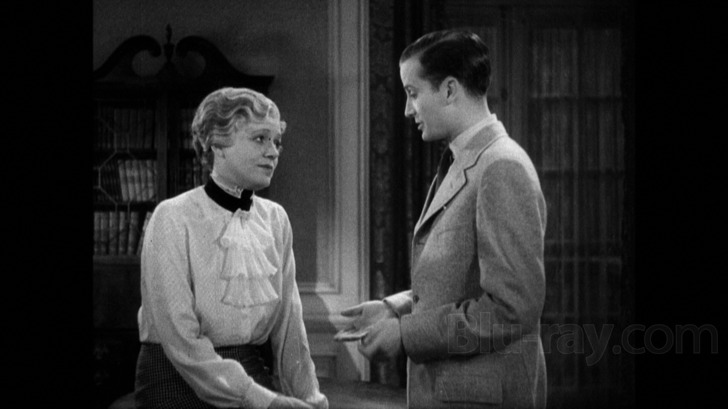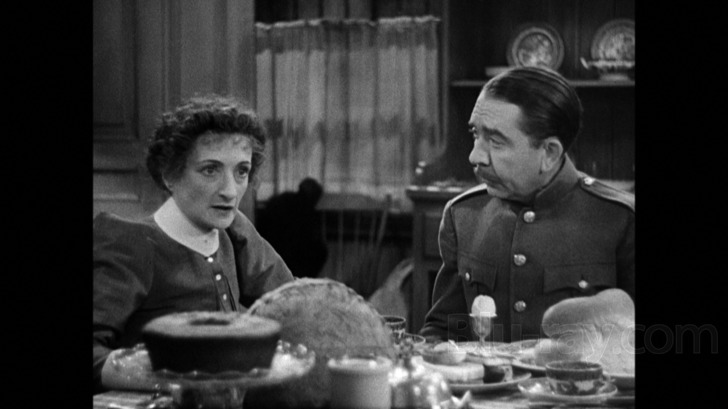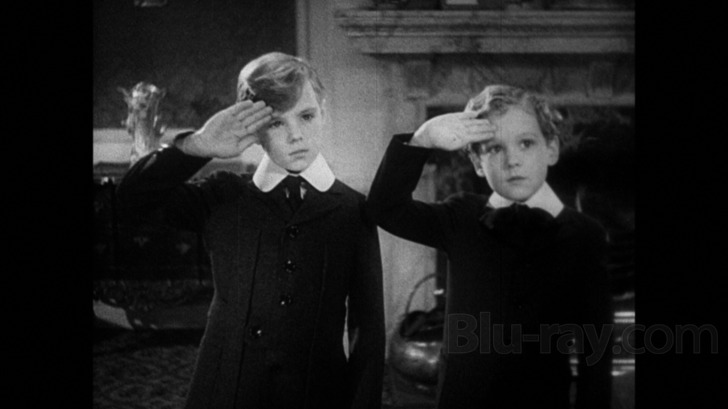Cavalcade Blu-ray Movie
HomeCavalcade Blu-ray Movie 
80th Anniversary / Fox Studio Classics / Blu-ray + DVD20th Century Fox | 1933 | 112 min | Not rated | Aug 06, 2013

Movie rating
6.4 | / 10 |
Blu-ray rating
| Users | 3.5 | |
| Reviewer | 3.0 | |
| Overall | 3.2 |
Overview
Cavalcade (1933)
English life from New Year's Eve 1899 until 1933 seen through the eyes of well-to-do Londoners Jane and Robert Marryot.
Starring: Diana Wynyard, Clive Brook, Una O'Connor, Herbert Mundin, Beryl MercerDirector: Frank Lloyd (I)
| Drama | 100% |
| Epic | Insignificant |
Specifications
Video
Video codec: MPEG-4 AVC
Video resolution: 1080p
Aspect ratio: 1.33:1
Original aspect ratio: 1.37:1
Audio
English: DTS-HD Master Audio Mono (48kHz, 24-bit)
Subtitles
English SDH, French, Spanish
Discs
50GB Blu-ray Disc
Two-disc set (1 BD, 1 DVD)
DVD copy
Playback
Region free
Review
Rating summary
| Movie | 3.5 | |
| Video | 3.5 | |
| Audio | 3.0 | |
| Extras | 2.0 | |
| Overall | 3.0 |
Cavalcade Blu-ray Movie Review
Marryot Rewards Program.
Reviewed by Jeffrey Kauffman August 20, 2013Cavalcade hasn’t aged particularly well, and remains one of the least likely films to win a Best Picture Academy Award, but in certain ways might be thought of as the Downton Abbey of its era. Noël Coward had already made his mark as an actor, song writer and a playwright by the time he wrote the stage version of Cavalcade in 1931. But despite occasional forays into the dramatic (and the lurid) in such outings as The Vortex, Coward was probably best known for his brisk comedy as well as for being a social critic masquerading as a social butterfly. Cavalcade was therefore rather unusual for its writer and was certainly Coward’s most ambitious stage production to date (and arguably of his entire career), a gargantuan enterprise featuring a cast and crew of several hundred (unthinkable in today’s economic climate), with a storyline spanning several decades in the life of an upper crust British family as well as a couple who in the opening scenes at least are their servants. The West End staging was highlighted by an impressive physical production featuring a then revolutionary set of hydraulic controls moving huge sets around to create a fluid, one might say cinematic, experience. Perhaps ironically when the play was adapted as a film (by Fox, before the advent of 20th Century), the proceedings became somehow more intimate, despite a large scale production that took full advantage of the medium, but now with the overwhelming scope and “cast of thousands” consigned largely to the sidelines, montages, or for interstitial bridging elements. The film will seem awfully creaky to modern day eyes, especially for those cynical types whose jaundiced views may lead to patent eye rolling as a series of “veddy, veddy” British types espouse the time honored traditions of faith, endurance, King and family.

While a 1933 American audience might have been expected to have been at least reasonably aware of some of the historical escapades informing Cavalcade’s march through three-plus decades of British life, modern day viewers may well be asking themselves questions like “Second Boer War? You mean there was more than one?” In fact Cavalcade begins on New Year’s Eve 1899, when Robert and Jane Marryot (Clive Brook and Diana Wynyard, the latter of whom received a Best Actress Academy Award nomination, losing to Katharine Hepburn for Morning Glory) arrive at their luxe London manse just before midnight strikes. Jane is upset that one of their young sons is still awake, and impatiently scolds him, threatening to give him a spanking (remember when things like that weren’t deemed politically incorrect?). Robert prevails upon her to let both kids get up to enjoy the arrival of a new century (evidently the debate that swirled around the globe as to whether the century and/or millennium begins with the year ending in zero or one was not a pressing matter for Coward). But echoing behind the revelry is the realization that the following day Robert is due to leave as part of Britain’s fighting forces in the Boer War in South Africa.
In a conceit that presages both Downtown Abbey and Upstairs, Downstairs, we’ve also been introduced to the Marryots’ staff, including the irrepressible butler Alfred Bridges (Herbert Mundin), who it turns out is also off to fight in the conflict, and his fussy wife Ellen (Una O’Connor), the Marryots’ maid. There’s some lip service given in these opening scenes to the horrors of war (Jane’s brother is one of the besieged troops who may not be able to survive in South Africa if reinforcements don’t get there soon), and in one of many semi-hysterical scenes, when Jane bids farewell to Robert at the dockside the next day, she gives a tearful speech more or less toward "stage right", her back turned to Robert. It’s in patently theatrical moments like this that Cavalcade most firmly displays both its stage bound roots as well as some of the conventions that were still being utilized in those early days of “talkie” cinema. The speech is obviously meant to be heartfelt and touching, but the sheer artificiality of it all probably won’t play very well to most modern day viewers.
Once both Robert and Alf return from the war more or less intact, the film starts to explore the class differences of these two disparate families. Alf has come to the conclusion that a life in “service” isn’t for him, and he sets off to become his own master, running a pub. Alf and Ellen therefore become symbols of an incipient British lower middle class attempting to better their station in life, while at the same time Robert and Jane symbolize the ruling elite who are struggling to maintain their status. Both couples experience the joys and traumas of raising children, and the film takes the participants through a number of major historical events, with the specter of war acting as major chapter stops.
Some of Cavalcade still resonates quite effectively, including Jane’s protestations against the madness of war, and some of the late in the film montages of the decline of faith and family. Other parts are less effective, with one supposed tragedy playing like a long lost Twilight Zone episode (an event which is in fact yet another link to Downton Abbey’s genesis in 1912—and, yes, that’s a big hint). Through it all Jane manages to muddle through somehow, evincing the resolute steadfastness that has come to personify the British spirit. Robert is left to largely act as cheerleader.
The kind of interesting thing about the social dynamic in Cavalcade is that despite the fact that the Marryots are really the focus of the film, its Alf and his brood that provide the real color. It’s as if Coward secretly knew the upper class was a bore, but realized he couldn’t fashion a truly British document without them. Director Frank Lloyd mounts the production with a high degree of technical merit, especially for that day and age, with some difficult tracking shots and a number of extremely well done montages. The performances, while typically theatrical in the then au courant early thirties’ manner, also manage to be quite effective, especially Wynyard and O’Connor (the two have a great scene together late in the film).
It might seem convenient to accord Cavalcade’s success and handful of Oscars as being redolent of a time when rampant Anglophilia ruled the American shores. Unfortunately, the equal success of Downton Abbey proves that this particular love affair shows know signs of abating. The film may in fact not have the same level of insight into the dissolution of class structure that the television series has, but when taken in the context of its time period, it’s a rather astonishingly cogent peering into the peerage (or at least those closer to it than the mere rank and file) and those whose birthrights weren’t quite as fortunate.
Cavalcade Blu-ray Movie, Video Quality 

Cavalcade is presented on Blu-ray courtesy of 20th Century Fox Home Entertainment with an AVC encoded 1080p transfer in 1.33:1. How you feel about this high definition presentation is probably going to depend on whether you're a glass half full or half empty kind of person. This is obviously a very old film without surviving original elements, and despite its impressive Oscar pedigree, it simply may not have been curated very effectively through the years. I have a sneaking suspicion that perhaps we're dealing with an older master that was sourced at least in part from dupe elements, as evidenced by some really fuzzy imagery and overwhelming grain some of the time (see screenshot six for just one good example of this tendency). That said, the film actually looks surprisingly good when taken as a whole. Contrast is generally excellent, though it tends to fluctuate, especially in the early going. The first twelve minutes or so of the film have some noticeable print through as well as density fluctuations which create a sort of flicker. Blacks and gray scale are generally extremely commendable. While fine detail never really pops incredibly, one has to have realistic expectations when considering the technology of the era, and generally speaking the image is decently sharp given that realization. There are some persistent scratches that may bother some, including one that lasts intermittently for several minutes at a time toward the right side of the frame. There are a lot of opticals scattered throughout this picture, and as should be expected, they have much increased grain and softness here. A BD-50 and rather healthy bitrate deliver an artifact free presentation that easily handles even the busy action montages.
Cavalcade Blu-ray Movie, Audio Quality 

Cavalcade features a lossless DTS-HD Master Audio Mono mix that delivers both dialogue and Coward's songs rather well, considering the film's age, though there's no getting past the tinny, boxy sound that simply is endemic to this era of sound recording. More problematic is some persistent distortion in the upper midrange which occasionally interrupts the smooth flow of the soundtrack. The film has surprisingly wide dynamic range for a film of this era, and the lossless rendering supports that very well.
Cavalcade Blu-ray Movie, Special Features and Extras 

- Fox Movietone News: Cavalcade Wins First Honors (480i; 1:00) is a rather stiff assemblage of Brook, Wynyard, Sheehan and Lloyd, celebrating the film's Oscar win.
- Audio Commentary by Film Historian Richard Schickel. Schickel can be rather curmudgeonly at times in his commentaries, but he actually seems to have quite the soft spot for Cavalcade. His commentary tends to focus on actor biographies, with a little production data rolled into the mix. He has a rather annoying tendency to use "um" or "uh" as a space filler in virtually every sentence.
Cavalcade Blu-ray Movie, Overall Score and Recommendation 

Cavalcade can't quite overcome its theatrical origins and the conventions of the time in which it was made, but that makes it all the more surprising that the film is as moving as it is. There's no denying that Cavalcade is a bit of a "downer", and one almost shudders to think of what Coward would have done with these families through the rest of the tumultuous twentieth century. Fox has done a largely commendable job in bringing this vaunted older film to Blu-ray. Image and audio quality are probably the best we can expect given the age and shape of the elements. Recommended.
Similar titles
Similar titles you might also like

This Happy Breed
1944

Grand Hotel
1932

Hamlet
2009

Brideshead Revisited
30th Anniversary Edition
1981

A Month in the Country
Limited Edition to 3000
1987

Mr. Turner
2014

Albert Nobbs
2011

The Big Parade
Warner Archive Collection
1925

Hereafter
2010

Mr. Selfridge: Season 4
2015

Things to Come
1936

The Entertainer
1960

Underground
1928

Hamlet
1948

How Green Was My Valley
Fox Studio Classics
1941

The Magnificent Ambersons
1942

Factory Girl
2006

Her Smell
2018

The Other Woman
Love and Other Impossible Pursuits
2009

Sunset Boulevard
1950